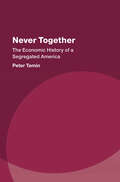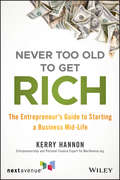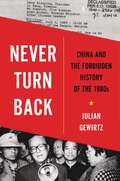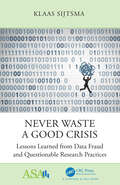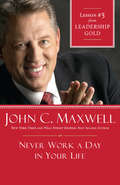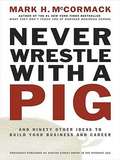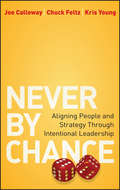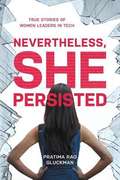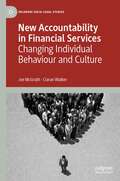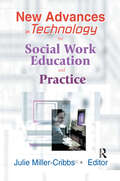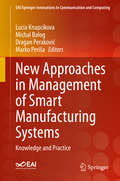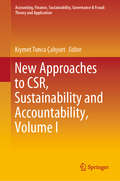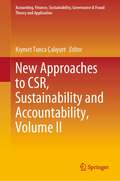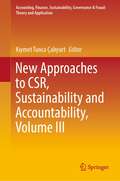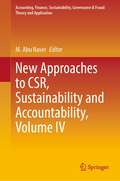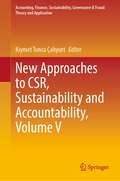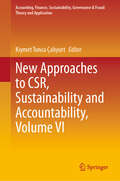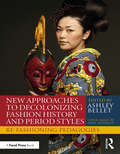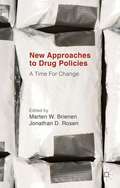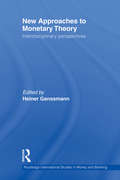- Table View
- List View
Never Together: The Economic History of a Segregated America
by Peter TeminIn November 2020, The New York Times asked fifteen on its columnists to 'explain what the past four years have cost America.' Not one of the columnists focused on President Trump's racism. This book seeks to redress this imbalance and bring Black Americans' role in our economy to the forefront. While all humans were created equal, economic history in the United States tells a different story. Reconstruction lasted for only a decade, and Jim Crow laws replaced it. The Civil Rights Movement lasted through the 1960s, yet decayed under President Nixon. The United States has been declining in the Social Product Index, where it now is the lowest of the G7 and 26th in the world. For health and happiness, Temin argues that we need lasting integration efforts that allow Black Americans equal opportunity. This book convincingly integrates Black and white activities into an inclusive economic history of America.
Never Too Old to Get Rich: The Entrepreneur's Guide to Starting a Business Mid-Life
by Kerry E. HannonStart a successful business mid-life When you think of someone launching a start-up, the image of a twenty-something techie probably springs to mind. However, Gen Xers and Baby Boomers are just as likely to start businesses and reinvent themselves later in life. Never Too Old to Get Rich is an exciting roadmap for anyone age 50+ looking to be their own boss and launch their dream business. This book provides up-to-date resources and guidance for launching a business when you're 50+. There are snappy profiles of more than a dozen successful older entrepreneurs, describing their inspirational journeys launching businesses and nonprofits, followed by Q&A conversations, and pull-out boxes containing action steps. The author walks you through her three-part fitness program: guidelines for becoming financially fit, physically fit, and spiritually fit, before delving more deeply into how would-be entrepreneurs over 50 can succeed. • Describes how you can find capital to start your own business• Offers encouraging stories of real people who have become their own bosses and succeeded as entrepreneurs• Written by PBS Next Avenue’s entrepreneur expert, Kerry Hannon• Teaches you how to start your own business Never Too Old to Get Rich is the ideal book for older readers looking to pursue new business ventures later in life.
Never Try to Teach a Pig to Sing: Still More Urban Folklore from the Paperwork Empire
by Alan Dundes Carl R. PagterNever Try to Teach a Pig to Sing documents the thriving folklore tradition that circulates in the workplace. Alan Dundes and Carl Pagter have collected more than two hundred and fifty "signs of the times"--the office memoranda, parodies, cartoons, and poems that daily make their way through copy machines, interoffice mail systems, and fax machines and are affixed to bulletin boards and water coolers. The rich vein of urban folklore tapped by this imaginative volume constitutes a great testament to one of the world's most prolific authors--anonymous. The popularity of the items featured in this timely book is apparent by their reproduction in mass or popular cultural form--as greeting cards, plaques, and bumper stickers--reminding us of the inevitable interplay between folklore and mass culture. Dundes and Pagter clearly demonstrate the existence of folklore in the modern urban technological world and refute the notion that folklore reflects only the past.
Never Turn Back: China and the Forbidden History of the 1980s
by Julian GewirtzThe history the Chinese Communist Party has tried to erase: the dramatic political debates of the 1980s that could have put China on a path to greater openness.On a hike in Guangdong Province in January 1984, Deng Xiaoping was warned that his path was a steep and treacherous one. “Never turn back,” the Chinese leader replied. That became a mantra as the government forged ahead with reforms in the face of heated contestation over the nation’s future. For a time, everything was on the table, including democratization and China’s version of socialism. But deliberation came to a sudden halt in spring 1989, with protests and purges, massacre and repression. Since then, Beijing has worked intensively to suppress the memory of this era of openness.Julian Gewirtz recovers the debates of the 1980s, tracing the Communist Party’s diverse attitudes toward markets, state control, and sweeping technological change, as well as freewheeling public argument over political liberalization. The administration considered bold proposals from within the party and without, including separation between the party and the state, empowering the private sector, and establishing an independent judiciary. After Tiananmen, however, Beijing systematically erased these discussions of alternative directions. Using newly available Chinese sources, Gewirtz details how the leadership purged the key reformist politician Zhao Ziyang, quashed the student movement, recast the transformations of the 1980s as the inevitable products of consensus, and indoctrinated China and the international community in the new official narrative.Never Turn Back offers a revelatory look at how different China’s rise might have been and at the foundations of strongman rule under Xi Jinping, who has intensified the policing of history to bolster his own authority.
Never Waste a Good Crisis: Lessons Learned from Data Fraud and Questionable Research Practices (ASA-CRC Series on Statistical Reasoning in Science and Society)
by Klaas SijtsmaThis book covers statistical consequences of breaches of research integrity such as fabrication and falsification of data, and researcher glitches summarized as questionable research practices. It is unique in that it discusses how unwarranted data manipulation harms research results and that questionable research practices are often caused by researchers’ inadequate mastery of the statistical methods and procedures they use for their data analysis. The author’s solution to prevent problems concerning the trustworthiness of research results, no matter how they originated, is to publish data in publicly available repositories and encourage researchers not trained as statisticians not to overestimate their statistical skills and resort to professional support from statisticians or methodologists.The author discusses some of his experiences concerning mutual trust, fear of repercussions, and the bystander effect as conditions limiting revelation of colleagues’ possible integrity breaches. He explains why people are unable to mimic real data and why data fabrication using statistical models stills falls short of credibility. Confirmatory and exploratory research and the usefulness of preregistration, and the counter-intuitivenature of statistics, are discussed.The author questions the usefulness of statistical advice concerning frequentist hypothesis testing, Bayes-factor use, alternative statistics education, and reduction of situational disturbances like performance pressure, as stand-alone means to reduce questionable research practices when researchers lack experience with statistics.An interview with the author can be found here: https://www.tilburguniversity.edu/magazine/overview/former-rector-sijtsma-turn-statistician-fight-fraud-and-sloppiness.
Never Work a Day in Your Life
by John MaxwellSmart leaders learn from their own mistakes. Smarter ones learn from others' mistakes--and successes. John C. Maxwell wants to help you become the smartest leader you can be by sharing Chapter 5,Never Work A Day In Your Life, of Leadership Gold with you. After nearly forty years of leading, Maxwell has mined the gold so you don't have to. Each chapter contains detailed application exercises and a "Mentoring Moment" for leaders who desire to mentor others using the book.
Never Wrestle with a Pig
by Mark H. MccormackDrawing upon forty years of experience from his own sports and celebrity management practice, Mark H. McCormack is back with common-sense advice aimed at business owners and would-be CEOs. McCormack's tips include: End your day on time People who say they can keep a secret usually can't It pays to overestimate your competition The best ideas cannot be stolen Know when to say "It's none of your business" Get paid for thinking rather than doing Time in front of the customer is the best time of all Be wary of unanimous agreement Not every budget deserves your respect Learn the art of picking up the check In ninety brief chapters that range in topic from getting ahead to staying competitive, McCormack makes clear that doing business in today's climate still involves the same basic elements of human interaction-intelligence, creativity, and efficiency-that have always meant the difference between success and failure. .
Never by Chance
by Joe Calloway Chuck Feltz Kris YoungPraise for Never By Chance"Joe Calloway, Chuck Feltz, and Kris Young have joined forces to write the book that senior management at companies large and small have been waiting for. Highly readable, loaded with innovative ideas and filled with seminal insights from both a consulting and CEO perspective, Never by Chance lays out a plan for aligning people and strategy to dramatically improve market share and ROI. If you're going to read one business book this year, this is it!"--Kevin J. Clancy, PhD, Chairman, Copernicus Marketing Consulting"Never by Chance is a real-world, pragmatic guide to authentic alignment, vision, and strategy. If you want to create enduring value for your customers that drives shareholder value, then read this book. A great read that lays out a foundational approach to aligning people, resources, and strategy."--Kevin Cashman, Senior Partner, Korn/Ferry Leadership & Talent Consulting; bestselling author of Leadership from the Inside Out"Calloway, Feltz, and Young offer a fresh perspective on what it takes to drive business strategy to its successful conclusion. This is a compelling contribution to the literature on the application of strategy and the importance of those things that really matter. It's a must-read for all those who labor in the vineyards of corporate America and those who aspire to it."--Benjamin Ola. Akande, PhD, Dean, School of Business and Technology, Webster University"Everyone ends up somewhere, but few end up somewhere on purpose. Doing things on purpose and for a purpose are critical to business success. Never by Chance makes a compelling case for intentional leadership in bringing all of a company's resources to bear on delivering the stakeholder value your organization exists to provide."--Steve Tourek, SVP and General Counsel, Marvin Windows and Doors
Nevertheless, She Persisted: True Stories of Women Leaders in Tech, First Edition
by Pratima Rao GluckmanIt is no secret that the technical world is a male-dominated space. From the cultural belief that Computer Science is a "subject for boys," to the assumptions and discrimination women experience in the field, it can be challenging for women at every stage to thrive in tech careers. <P><P>Nevertheless, some high-performing women persist and succeed as leaders in tech despite the gender biases pitted against them. Pratima Rao Gluckman-a female leader in tech herself-embarked on a project to collect stories of the leadership journeys of such women. She wanted to know the details of these women's stories, and how they accomplished their achievements. What influenced them during their childhoods? Who were their mentors? What successes and failures did they experience? What magical ingredients helped them thrive in a male-dominated industry? <P><P>These questions and more inspired Gluckman to interview nineteen women leaders in several levels of technology industry, including VPs, CEOs and directors, all of which are collected in this groundbreaking book, Nevertheless, She Persisted. Whether you are a young woman thinking of a career in software, a middle-career or executive woman, a parent, or a man curious about the role gender plays in tech, this book reveals the secrets, successes, and hidden struggles that women have endured to become both highly accomplished in their technical skills and effective senior leaders in their organizations. Their stories are illuminating, intended to inspire generations of women and help free our society from the limiting belief that ability is somehow linked to gender....
New Accountability in Financial Services: Changing Individual Behaviour and Culture (Palgrave Socio-Legal Studies)
by Joe McGrath Ciaran WalkerThis book is a critical examination of recently introduced individual accountability regimes that apply to the financial services industry in the UK (SMCR) and Australia (BEAR and the forthcoming FAR), together with a forthcoming new individual accountability regime ( in particular, SEAR) in Ireland. It provides a framework for analysing whether these regimes will achieve behavioural change in the financial services industry. This book argues that, whilst sanctioning individuals to deter future misconduct is an important part of any successful regulatory strategy, the focus should be on ensuring that individuals in the financial services industry internalise the norms of behaviour expected under the new regimes. In this regard, the analysis in this book is informed by criminological theory, regulatory theory and behavioural science. The work also argues for a “trajectory towards professionalisation” of financial services, and banking in particular, as an important means of positively influencing industry-wide norms of behaviour, which have a key influence on firms’ and individuals’ behaviours.
New Advances in Technology for Social Work Education and Practice
by Julie Miller-CribbsGain practical knowledge of the latest technological innovations in social work! This comprehensive book examines the role of technology in four areas: information management, distance education evaluation, video- and web-based learning and training, and working with vulnerable populations. New Advances in Technology for Social Work Education and Practice discusses constructive, proven applications of technology in settings from modern universities to rural India. The empirical research and case studies presented here offer practical suggestions for implementing effective technological solutions tailored to the needs of social workers and their clients.New Advances in Technology for Social Work Education and Practice includes useful strategies for creating user-friendly systems, including: involving practitioners in systems design and evaluation dealing with political issues choosing effective instructors for distance education developing multimedia testing for supervisor training designing Web pages for users with disabilities
New Appeal of Private Labels
by David Dunne Chakravarthi NarasimhanPrivate-label products are anathema to many consumer goods manufacturers--cheap imitations that undermine margins and weaken product categories. But the growing power and sophistication of retailers has changed that competitive dynamic. Private labels now offer a range of opportunities for savvy manufacturers. Perhaps most notable, retailers are working with manufacturers to bring out store brands whose quality matches or even exceeds that of brand-name goods. These premium labels offer better margins than traditional private labels and can serve as a low-risk way for manufacturers to try new product categories. Like "fighter brands," private labels can help a manufacturer preserve market share in a category when it decides to raise the price of its brand-name product. Or a manufacturer in the number-two slot might design its private label to imitate--and take sales from--the market leader in a category. The authors say the risks of producing private labels are often exaggerated. Retailer switching isn't as easy as is often believed, particularly for manufacturers who work closely with retail partners. And manufacturers who set clear priorities can make sure their private-label sales don't distract them from promoting the main brand. The authors warn that different manufacturers will want to go with different private-label strategies. Private labels are likely to make most sense when entry barriers are low, when substantial economies of scale exist, or when the label is a premium line for a category with low price sensitivity. For manufacturers who seek closer ties with retailers, private labels may represent a neglected opportunity.
New Approaches in Management of Smart Manufacturing Systems: Knowledge and Practice (EAI/Springer Innovations in Communication and Computing)
by Michal Balog Lucia Knapcikova Dragan Peraković Marko PerišaThis book provides a comprehensive and effective exchange of information on current developments in the management of manufacturing systems and Industry 4.0. The book aims to establish channels of communication and disseminate knowledge among professionals working in manufacturing and related institutions. In the book, researchers, academicians and practitioners in relevant fields share their knowledge from the sectors of management of manufacturing systems. The chapters were selected from several conferences in the field, with the topics including management of manufacturing systems with support for Industry 4.0, logistics and intelligent manufacturing systems and applications, cooperation management, and its effective applications. The book also includes case studies in logistics, RFID applications, and economic impacts in logistics, ICT support for industry 4.0, industrial and smart logistics, intelligent manufacturing systems and applications
New Approaches to CSR, Sustainability and Accountability, Volume I (Accounting, Finance, Sustainability, Governance & Fraud: Theory and Application)
by Kıymet Tunca ÇalıyurtThis book provides a platform for discussing the challenges that organizations face in order to implement sustainability, ethics, and effective corporate governance, all of which are important elements of “standing out” from other companies. Examining the background of the New European Consensus on development with the new guiding motto ‘Our World, Our Dignity, Our Future’, the authors explore how this new legislation on sustainability issues around the world is forcing companies to deal directly with sustainability issues. The 2030 Agenda for Sustainable Development (2030 Agenda), adopted by the United Nations in September 2015, is the international community’s response to global challenges and trends in connection with sustainable development. With the Sustainable Development Goals (SDGs) at its core, the 2030 Agenda is a transformative political framework designed to eradicate poverty and achieve sustainable development globally. It balances the economic, social and environmental dimensions of sustainable development, including the key issues of governance and peaceful and inclusive societies, and recognizes the essential interlinkages between its goals and targets, i.e., that they must be implemented as a whole and not selectively. The respective chapters in this volume raise a number of questions regarding companies’ ability to implement sustainability, ethics, and effective corporate governance. Simultaneously, they explore how organizations must adapt to sustainability-related developments.
New Approaches to CSR, Sustainability and Accountability, Volume II (Accounting, Finance, Sustainability, Governance & Fraud: Theory and Application)
by Kıymet Tunca ÇalıyurtThis book continues the discussion on the challenges that organizations face in order to implement sustainability, ethics, and effective corporate governance, all of which are important elements of “standing out” from other companies. Examining the background of the New European Consensus on development with the new guiding motto ‘Our World, Our Dignity, Our Future,’ the authors explore how this new legislation on sustainability issues around the world is forcing companies to deal directly with sustainability issues.The 2030 Agenda for Sustainable Development (2030 Agenda), adopted by the United Nations in September 2015, is the international community’s response to global challenges and trends in connection with sustainable development. With the Sustainable Development Goals (SDGs) at its core, the 2030 Agenda is a transformative political framework designed to eradicate poverty and achieve sustainable development globally. It balances the economic, social, and environmental dimensions of sustainable development, including the key issues of governance and peaceful and inclusive societies, and recognizes the essential interlinkages between its goals and targets, i.e., that they must be implemented as a whole and not selectively. The respective chapters in this volume raise a number of questions regarding corporate social responsibility, ethics, and corporate governance in the face of new technology, and new approaches to climate change and sustainability reporting.
New Approaches to CSR, Sustainability and Accountability, Volume III (Accounting, Finance, Sustainability, Governance & Fraud: Theory and Application)
by Kıymet Tunca ÇalıyurtThis book continues the discussion in the first two volumes on the challenges that organizations face in order to implement sustainability, ethics, and effective corporate governance, all of which are important elements of “standing out” from other companies. Examining the background of the New European Consensus on development with the new guiding motto ‘Our World, Our Dignity, Our Future,’ the authors explore how this new legislation on sustainability issues around the world is forcing companies to deal directly with sustainability issues.The 2030 Agenda for Sustainable Development (2030 Agenda), adopted by the United Nations in September 2015, is the international community’s response to global challenges and trends in connection with sustainable development. With the Sustainable Development Goals (SDGs) at its core, the 2030 Agenda is a transformative political framework designed to eradicate poverty and achieve sustainable development globally. It balances the economic, social, and environmental dimensions of sustainable development, including the key issues of governance and peaceful and inclusive societies, and recognizes the essential interlinkages between its goals and targets, i.e., that they must be implemented as a whole and not selectively. The respective chapters in this volume raise a number of questions regarding corporate social responsibility, ethics, and corporate governance in the face of new technology, and new approaches to climate change and sustainability reporting.
New Approaches to CSR, Sustainability and Accountability, Volume IV (Accounting, Finance, Sustainability, Governance & Fraud: Theory and Application)
by M. Abu NaserThis book continues the discussion on the challenges that organizations face in order to implement sustainability, ethics, and effective corporate governance, all of which are important elements of “standing out” from other companies. Examining the background of the New European Consensus on development with the new guiding motto ‘Our World, Our Dignity, Our Future,’ the authors explore how this new legislation on sustainability issues around the world is forcing companies to deal directly with sustainability issues.The 2030 Agenda for Sustainable Development (2030 Agenda), adopted by the United Nations in September 2015, is the international community’s response to global challenges and trends in connection with sustainable development. With the Sustainable Development Goals (SDGs) at its core, the 2030 Agenda is a transformative political framework designed to eradicate poverty and achieve sustainable development globally. It balances the economic, social, and environmental dimensions of sustainable development, including the key issues of governance and peaceful and inclusive societies, and recognizes the essential interlinkages between its goals and targets, i.e., that they must be implemented as a whole and not selectively. The respective chapters in this volume raise a number of questions regarding corporate social responsibility, ethics, and corporate governance in the face of new technology, and new approaches to climate change and sustainability reporting.
New Approaches to CSR, Sustainability and Accountability, Volume V (Accounting, Finance, Sustainability, Governance & Fraud: Theory and Application)
by Kıymet Tunca ÇalıyurtThis book continues the discussion from the first four volumes on the challenges that organizations face in order to implement sustainability, ethics, and effective corporate governance, all of which are important elements of “standing out” from other companies. Examining the background of the New European Consensus on development with the new guiding motto ‘Our World, Our Dignity, Our Future,’ the authors explore how this new legislation on sustainability issues around the world is forcing companies to deal directly with sustainability issues. The 2030 Agenda for Sustainable Development (2030 Agenda), adopted by the United Nations in September 2015, is the international community’s response to global challenges and trends in connection with sustainable development. With the Sustainable Development Goals (SDGs) at its core, the 2030 Agenda is a transformative political framework designed to eradicate poverty and achieve sustainable development globally. It balances the economic, social, and environmental dimensions of sustainable development, including the key issues of governance and peaceful and inclusive societies, and recognizes the essential interlinkages between its goals and targets, i.e., that they must be implemented as a whole and not selectively. The respective chapters in this volume raise a number of questions regarding corporate social responsibility, ethics, and corporate governance in the face of new technology and new approaches to climate change and sustainability reporting.
New Approaches to CSR, Sustainability and Accountability, Volume VI (Accounting, Finance, Sustainability, Governance & Fraud: Theory and Application)
by Kıymet Tunca ÇalıyurtThis book continues the discussion from the first five volumes on the challenges that organizations face in order to implement sustainability, ethics, and effective corporate governance, all of which are important elements of &“standing out&” from other companies. Examining the background of the New European Consensus on development with the new guiding motto &‘Our World, Our Dignity, Our Future,&’ the authors explore how this new legislation on sustainability issues around the world is forcing companies to deal directly with sustainability issues.
New Approaches to Decolonizing Fashion History and Period Styles: Re-Fashioning Pedagogies
by Ashley BelletNew Approaches to Decolonizing Fashion History and Period Styles: Re-Fashioning Pedagogies offers a wide array of inclusive, global, practical approaches for teaching costume and fashion history. Costume designers, technicians, and historians have spent the last several years re-evaluating how they teach costume and fashion history, acknowledging the need to refocus the discourse to include a more global perspective. This book is a collection of pedagogical methods aimed to do just that, with an emphasis on easy reference, accessible activities, and rubrics, and containing a variety of ways to restructure the course. Each chapter offers a course description, syllabus calendar, course objectives, and learning outcomes, as well as sample activities from instructors across the country who have made major changes to their coursework. Using a combination of personal narratives, examples from their work, bibliographies of helpful texts, and student responses, contributors suggest a variety of ways to decolonize the traditionally Western-focused fashion history syllabus. This collection of pedagogical approaches is intended to support and inspire instructors teaching costume design, costume history, fashion history, period styles, and other aesthetic histories in the arts.
New Approaches to Decolonizing Fashion History and Period Styles: Re-Fashioning Pedagogies
by Ashley BelletNew Approaches to Decolonizing Fashion History and Period Styles: Re-Fashioning Pedagogies offers a wide array of inclusive, global, practical approaches for teaching costume and fashion history.Costume designers, technicians, and historians have spent the last several years re-evaluating how they teach costume and fashion history, acknowledging the need to refocus the discourse to include a more global perspective. This book is a collection of pedagogical methods aimed to do just that, with an emphasis on easy reference, accessible activities, and rubrics, and containing a variety of ways to restructure the course. Each chapter offers a course description, syllabus calendar, course objectives, and learning outcomes, as well as sample activities from instructors across the country who have made major changes to their coursework. Using a combination of personal narratives, examples from their work, bibliographies of helpful texts, and student responses, contributors suggest a variety of ways to decolonize the traditionally Western-focused fashion history syllabus.This collection of pedagogical approaches is intended to support and inspire instructors teaching costume design, costume history, fashion history, period styles, and other aesthetic histories in the arts.
New Approaches to Drug Policies: A Time for Change
by Marten W. Brienen Jonathan D. RosenThe U. S. -led war on drugs has failed: drugs remain purer, cheaper and more readily available than when the war on drugs began in 1971. The drug war also has resulted in extreme levels of violence as drug traffickers and organized criminals compete for control of territory. Prohibitionist policies have destroyed the lives of millions of people as prisons warehouse drug offenders. This important volume represents an effort to map new approaches to drug policies. The contributors write from various disciplinary backgrounds and provide crucial insights on a wide-range of topics, including the gang-drug nexus, delinquency, legalization, trafficking, decriminalization, intervention programs and prison reform. This volume also provides a number of policy solutions and alternatives to the current drug strategies. Includes contributions from: Marten W. Brienen, Ted Galen Carpenter, Roger G. Dunham, Gregory Fulkerson, Betty Horwitz, Caitlin Elizabeth Hughes, Hanna Samir Kassab, Ana Maria Lobos, Bradford R. McGuinn, Fida Mohammad, Keri O'Neal, J. Bryan Page, Susan A. Phillips, Vanessa Rayan, Jonathan D. Rosen, Alex Stevens, Steven L. West, and Marcelo Rocha e Silva Zorovich.
New Approaches to Economic and Social History: A Concise History of International Finance
by Larry NealEver since the financial crisis of 2008, doubts have been raised about the future of capitalism. In this broad-ranging survey of financial capitalism from antiquity to the present, Larry Neal reveals the ways in which the financial innovations throughout history have increased trade and prosperity as well as improving standards of living. These innovations have, however, all too often led to financial crises as a result of the failure of effective coordination among banks, capital markets and governments. The book examines this key interrelationship between financial innovation, government regulation and financial crises across three thousand years, showing through past successes and failures the key factors that underpin any successful recovery and sustain economic growth. The result is both an essential introduction to financial capitalism and also a series of workable solutions that will help both to preserve the gains we have already achieved and to mitigate the dangers of future crises.
New Approaches to Economic and Social History: An Economic History of Europe
by Paul Sharp Karl Gunnar Persson Persson, Karl Gunnar and Sharp, PaulThis revised and extended edition of the leading textbook on European economic history has been updated to take account of contemporary economic developments and the latest research and debates. A concise and accessible introduction that covers the full sweep of the European history, the book focuses on the interplay between the development of institutions and the generation and diffusion of knowledge-based technologies. With simple explanations of key economic principles, the book is an ideal introduction for students in history and economics. Revised textboxes and figures, an extensive glossary, suggestions for further reading and a suite of online resources lead students to a comprehensive understanding of the subject. New material covers contemporary economic developments such as the financial crises of 2007/2008, the Eurozone crisis, new trends in inequality and the austerity debates. This remains the only textbook students need to understand Europe's unique economic development and its global context.
New Approaches to Monetary Theory: Interdisciplinary Perspectives (Routledge International Studies In Money And Banking Ser. #63)
by Heiner GanssmannEverybody uses money every day, but we rarely stop to think about how money works. In this book, scholars from different disciplines seek to answer that question; from historians to economists, sociologists, a philosopher and a physicist. Money works as a social construction because we have mutual expectations that support its use – despite the seeming irrationality of trading valuable things or doing strenuous work for pieces of paper or numbers in accounts. Recently, there has been a revival of interest in monetary theory, not least because the impacts of globalizing markets and of new communication and information technologies have changed the forms of money. The deep crisis of the financial system has demonstrated the importance of a functioning monetary system and although renewed interest in this has led to significant contributions in various fields, it remains true that no social science discipline on its own is sufficiently equipped to explain the basic workings of monetary systems, their rapid innovation and their effects on social, economic and political structures. The contributors to this book report on their latest research on the origins of money, on the nature of monetary transactions, on money and the state, and on the role of money and finance in the recent global crisis. They show how established theories of money and the policies guided by these theories went wrong. This collection will be a valuable resource for students and researchers seeking a deeper understanding of money.
